Transforming fresh mushrooms into versatile powders unlocks a world of potential that extends far beyond traditional culinary applications. Mushroom powders—concentrated forms of fungi rich in flavor compounds, nutrients, and bioactive substances—have surged in popularity among chefs, health enthusiasts, and home growers alike. Whether you're looking to enhance umami in everyday cooking, create functional beverages, or harness the concentrated benefits of medicinal mushrooms, powders offer convenience and potency in a shelf-stable form. This comprehensive guide explores everything you need to know about mushroom powders, including how to create your own from mushrooms grown in your Lykyn Smart Mushroom Grow Kit.
The Rising Popularity of Mushroom Powders
Mushroom powders have transcended their niche origins to become mainstream ingredients found in everything from high-end restaurants to everyday home kitchens and wellness routines.
From Traditional Uses to Modern Applications
The practice of drying and powdering mushrooms dates back centuries in traditional medicine systems, particularly in Asian cultures where fungi like reishi, shiitake, and cordyceps have long been valued for their health-supporting properties. However, several factors have contributed to their recent surge in popularity:
- Growing interest in food as medicine and functional ingredients
- Increased awareness of mushrooms' nutritional and bioactive compounds
- The convenience factor—shelf-stable powders that retain benefits year-round
- Culinary trends emphasizing natural flavor enhancers and umami development
- Sustainability considerations, as powdering extends usability and reduces waste
What began as primarily a medicinal practice has evolved into a multifaceted ingredient category spanning culinary innovation, supplement formulation, and even cosmetic applications.
The Advantages of Powdered Form
Converting mushrooms to powder format offers several significant benefits:
- Extended Shelf Life: Properly dried and stored mushroom powders can last 1-2 years while maintaining potency
- Concentration of Compounds: The drying and powdering process concentrates beneficial compounds per gram
- Ease of Consumption: Powders can be added to foods and beverages without the texture or taste barriers some find challenging in whole mushrooms
- Versatility: A single powder can be used across multiple applications from cooking to capsules
- Bioavailability: The breakdown of cell walls during processing can increase the accessibility of certain compounds
For home growers using systems like the Lykyn Smart Mushroom Grow Kit, converting harvests to powder provides an excellent preservation method that maximizes the utility and longevity of your cultivation efforts.
Popular Types of Mushroom Powders and Their Benefits
While virtually any mushroom can be converted to powder form, certain varieties have gained particular popularity due to their flavor profiles or functional properties.
Culinary-Focused Mushroom Powders
These powders are primarily valued for their flavor enhancement capabilities:
Porcini Powder
- Flavor Profile: Intense umami, nutty, earthy
- Culinary Uses: Seasoning meats, enhancing sauces, elevating risotto
- Distinguishing Features: Often considered the gold standard for mushroom flavor enhancement
- Nutrient Highlights: Rich in protein, potassium, and B vitamins
Shiitake Powder
- Flavor Profile: Rich umami with garlic and woodsy notes
- Culinary Uses: Soups, stews, marinades, and vegetarian dishes
- Distinguishing Features: Versatile everyday enhancer that complements various cuisines
- Nutrient Highlights: Contains eritadenine and beta-glucans, along with B vitamins
Black Trumpet Powder
- Flavor Profile: Deep, smoky, almost truffle-like intensity
- Culinary Uses: Luxury applications where truffle notes are desired
- Distinguishing Features: One of the most aromatic and flavorful of all mushroom powders
- Nutrient Highlights: Contains selenium and antioxidant compounds
Functionally-Focused Mushroom Powders
These varieties are primarily valued for their bioactive compounds and potential health benefits:
Lion's Mane Powder
- Primary Benefits: Cognitive support, nervous system health
- Active Compounds: Hericenones and erinacines
- Flavor Notes: Mild, slightly seafood-like when fresh; nutty when dried
- Popular Uses: Coffee additions, smoothies, capsules
Reishi Powder
- Primary Benefits: Immune modulation, stress adaptation, sleep support
- Active Compounds: Triterpenes, beta-glucans, ganoderic acids
- Flavor Notes: Bitter, woody (generally not used primarily for flavor)
- Popular Uses: Teas, tinctures, capsules, adaptogenic blends
Cordyceps Powder
- Primary Benefits: Energy, stamina, respiratory support
- Active Compounds: Cordycepin, adenosine, polysaccharides
- Flavor Notes: Mild, slightly nutty with earthy undertones
- Popular Uses: Pre-workout formulations, adaptogenic blends, broths
Turkey Tail Powder
- Primary Benefits: Immune support, gut health
- Active Compounds: Polysaccharide-K (PSK), polysaccharide peptide (PSP)
- Flavor Notes: Mild, slightly earthy
- Popular Uses: Teas, capsules, functional food additions
For home growers, varieties like shiitake and lion's mane are particularly suitable for powdering, as they grow well in controlled environments like the Lykyn Smart Mushroom Grow Kit and offer both culinary and functional benefits.

Creating Your Own Mushroom Powders: From Fresh to Powder
One of the most rewarding aspects of growing mushrooms at home with a Lykyn Smart Mushroom Grow Kit is the ability to create your own fresh, high-quality mushroom powders.
Essential Equipment for DIY Mushroom Powders
To create professional-quality mushroom powders at home, you'll need:
- Food Dehydrator: With temperature control (ideally 110-130°F/43-54°C range)
- Coffee/Spice Grinder: Dedicated for mushrooms to prevent cross-contamination
- Fine Mesh Sieve/Strainer: For filtering larger pieces after initial grinding
- Airtight Storage Containers: Preferably amber glass jars to protect from light
- Desiccant Packets: To ensure continued dryness during storage
- Labels and Markers: For dating and identifying your powders
While specialized equipment yields the best results, beginners can start with oven drying (at lowest setting with door ajar) and a standard blender.
Step-by-Step Process for Homemade Mushroom Powders
Follow these steps to create high-quality mushroom powders from your home-grown harvest:
1. Selection and Preparation
- Choose fresh, prime-quality mushrooms at peak maturity
- Clean thoroughly using a soft brush or barely damp cloth (avoid soaking)
- Inspect carefully for any signs of mold, decay, or insect damage
- Slice evenly (approximately ¼ inch/6mm thickness) for uniform drying
2. Drying Process
- Arrange mushroom slices in a single layer on dehydrator trays
- Set temperature to 110-125°F (43-52°C)
- Dry until completely crisp (typically 4-8 hours depending on variety and thickness)
- Test for complete dryness—mushrooms should snap cleanly rather than bend
- Allow to cool completely before grinding to prevent condensation
3. Grinding and Filtering
- Process dried mushrooms in a dedicated coffee/spice grinder in small batches
- Pulse rather than continuous grinding to prevent overheating
- Sift through a fine mesh strainer to separate any larger pieces
- Return larger pieces to grinder for further processing
- Repeat until desired fineness is achieved
4. Proper Storage
- Transfer immediately to airtight containers
- Add a food-grade desiccant packet to each container
- Label with mushroom type and date
- Store in a cool, dark location
- Check periodically for any signs of moisture or clumping
5. Quality Testing
- Visually inspect for uniform texture and appropriate color
- Check aroma for freshness and characteristic mushroom scent
- Verify powder flows freely without clumping (indicates proper dryness)
Following this process ensures maximum retention of flavor compounds, nutrients, and bioactive substances in your homemade mushroom powders.
Optimization for Different Mushroom Varieties
Different mushroom species may require slight modifications to the basic process:
- Shiitake: Stems can be tough—either discard or grind separately for stock/broth applications
- Oyster Mushrooms: Dry quickly due to thin flesh—check after 3-4 hours
- Lion's Mane: Best dried at slightly lower temperatures (100-110°F/38-43°C) to preserve sensitive compounds
- Reishi: Woody texture requires longer grinding time—may need to process in multiple stages
- Button/Cremini: Higher moisture content—may require longer drying times
For growers using the Lykyn Smart Mushroom Grow Kit, timing harvests strategically allows for batch processing of powders, maximizing efficiency.

Culinary Applications: Elevating Everyday Cooking
Mushroom powders serve as powerful flavor enhancers and nutritional boosters in countless culinary applications.
Umami Enhancement Strategies
Mushroom powders excel at adding depth and savory complexity to dishes:
- Base Building: Add 1-2 teaspoons to soups, stews, and sauces at the beginning of cooking
- Flavor Layering: Combine with other umami-rich ingredients like tomatoes, aged cheese, or soy sauce for compound effect
- Salt Reduction: Use mushroom powder to maintain flavor depth while cutting sodium
- Vegetarian Depth: Add to plant-based dishes to create meat-like richness
- Finishing Touch: Sprinkle fine powder as a final seasoning on completed dishes
The concentrated glutamates and nucleotides in mushroom powders activate umami receptors more efficiently than many other plant-based ingredients.
Creative Culinary Uses
Beyond basic flavor enhancement, innovative chefs and home cooks are finding diverse applications:
Seasoning Blends
- Create signature spice mixes incorporating mushroom powders with herbs and spices
- Develop umami salt by blending sea salt with 15-20% mushroom powder
- Make vegetable rubs for roasting or grilling
Baking Applications
- Add to bread doughs (particularly sourdough) for complexity
- Incorporate into savory shortbreads or crackers
- Enhance pizza and focaccia doughs
Sauce Foundations
- Use as an instant stock base by rehydrating with hot water
- Create dairy-free creamy sauces with added depth
- Thicken and enrich gravies without additional fat
Innovative Uses
- Rim glasses for savory cocktails
- Create umami-rich desserts (particularly chocolate applications)
- Infuse oils and vinegars for dressings
For those growing their own mushrooms with the Lykyn Smart Mushroom Grow Kit, experimenting with powders from different varieties offers a playground for culinary creativity. Check out our guide on cooking with fresh shiitake mushrooms for additional inspiration.
Chef-Recommended Pairings by Mushroom Type
Different mushroom powders complement specific ingredients particularly well:
| Mushroom Powder | Exceptional Pairings | Recommended Applications |
|---|---|---|
| Porcini | Beef, eggs, risotto, potatoes | Steak seasonings, egg dishes, potato gratins |
| Shiitake | Chicken, rice, leafy greens | Stir-fries, rice pilafs, poultry seasoning |
| Lion's Mane | Seafood, pasta, cauliflower | Cream sauces, seafood seasonings, vegetable dishes |
| Black Trumpet | Wild game, root vegetables | Luxury seasonings, winter stews, root vegetable dishes |
| Oyster | Pork, corn, legumes | Chowders, bean dishes, pork seasonings |
These pairings leverage the natural affinity between specific mushroom varieties and complementary ingredients.
Wellness Applications: Beyond the Kitchen
Beyond culinary uses, mushroom powders have gained significant traction in wellness routines for their concentrated bioactive compounds.
Creating Functional Beverages
Mushroom powders can be incorporated into various beverages:
Coffee Enhancements
- Add ½-1 teaspoon of lion's mane, chaga, or cordyceps powder to morning coffee
- Blend with cacao and coffee for mocha-inspired functional beverages
- Create mushroom-infused cold brew concentrates
Tea and Elixirs
- Simmer reishi or turkey tail powder with hot water for traditional tea
- Combine mushroom powders with herbs like ginger, turmeric, or cinnamon
- Create evening elixirs with calming mushrooms like reishi and supporting herbs
Smoothie Additions
- Add neutral-flavored mushroom powders like lion's mane to fruit smoothies
- Create performance-focused blends with cordyceps and protein
- Develop green smoothies with immune-supporting mushroom additions
DIY Supplement Creation
For those specifically interested in the functional benefits of mushroom powders:
- Capsule Filling: Use empty vegetable capsules and a capsule filling device to create custom supplements
- Tincture Making: Combine powders with alcohol or glycerin to create concentrated extracts
- Honey Infusions: Mix mushroom powders into raw honey for medicinal honey preparations
- Gummy Production: Incorporate powders into homemade gummy recipes for easier consumption
- Custom Blends: Create personalized adaptogenic formulas combining multiple mushroom powders
These DIY approaches allow for customization based on personal health goals and preferences.
Topical and External Applications
Some mushroom powders have found their way into external applications:
- Face Masks: Mixed with clay or other natural ingredients for skin-supporting masks
- Body Scrubs: Added to exfoliating preparations for their antioxidant properties
- Hair Treatments: Incorporated into conditioning treatments for potential benefits
- Bath Soaks: Added to bath preparations for whole-body exposure
While research on topical mushroom applications continues, traditional practices suggest potential benefits worth exploring.
For those growing medicinal mushrooms at home with the Lykyn Smart Mushroom Grow Kit, creating these wellness preparations provides a direct connection between cultivation and personal health practices.

Storage, Shelf Life, and Quality Considerations
Proper storage techniques are essential to maintain the potency, flavor, and safety of mushroom powders.
Optimal Storage Conditions
To preserve quality, store mushroom powders with attention to several factors:
- Container Type: Airtight glass containers preferred over plastic
- Light Protection: Amber or opaque containers to prevent light degradation
- Temperature Control: Cool storage between 55-65°F (13-18°C) ideal
- Humidity Management: Include desiccant packets, particularly in humid climates
- Contamination Prevention: Use clean, dry utensils for removal
- Size Consideration: Store in smaller containers that get used up quickly once opened
These conditions minimize exposure to the primary factors that degrade quality: oxygen, light, heat, and moisture.
Signs of Quality Deterioration
Be vigilant for indicators that mushroom powders may be past their prime:
- Aroma Changes: Loss of characteristic mushroom smell or development of off-odors
- Visual Changes: Clumping, color shifts, or visible moisture
- Texture Alteration: Powder no longer flows freely or feels damp
- Flavor Degradation: Diminished taste intensity or altered flavor profile
- Mold Development: Any visible mold growth (requires immediate disposal)
Regular quality checks prevent using deteriorated products that may have lost potency or developed safety concerns.
Extending Shelf Life
Several strategies can maximize the longevity of your mushroom powders:
- Vacuum Sealing: For long-term storage of larger quantities
- Refrigeration Option: Especially for high-oil-content mushroom powders
- Portion Control: Package in smaller quantities for frequent use
- Oxygen Absorbers: Consider adding to storage containers for additional protection
- Periodic Refreshing: Re-dehydrate if slight moisture absorption occurs (before any mold develops)
With proper storage techniques, most mushroom powders maintain optimal quality for 6-12 months and remain usable for up to 2 years.
For those regularly producing powders from their Lykyn Smart Mushroom Grow Kit harvests, implementing a rotation system ensures you're always using the freshest products while minimizing waste.
FAQ About Mushroom Powders
What's the difference between mushroom powder and mushroom extract powder?
Can I make mushroom powder from any mushrooms grown in my Lykyn chamber?
How much mushroom powder should I use in cooking?
Is it better to use fresh mushrooms or mushroom powder?
How can I ensure my homemade mushroom powder is safe?
Beyond Basics: Advanced Techniques for Mushroom Powder Enthusiasts
For those who have mastered the fundamentals of mushroom powder creation, several advanced techniques can further enhance quality and application possibilities.
Double Extraction Methods
For medicinal mushrooms with both water-soluble and alcohol-soluble compounds, double extraction creates more potent powders:
- Water Extraction: Simmer dried mushrooms in water for 1-2 hours to extract water-soluble polysaccharides
- Alcohol Extraction: Soak the same mushrooms in high-proof alcohol (typically 40-50% ABV) for 2-4 weeks to extract triterpenes and other alcohol-soluble compounds
- Combination: Combine both extracts, then dehydrate to create a potent extract powder
This technique is particularly valuable for reishi, chaga, and turkey tail mushrooms, where different beneficial compounds require different extraction methods.
Specialized Drying for Compound Preservation
Certain advanced drying techniques can optimize specific compounds:
- Sun Exposure for Vitamin D: Brief sunlight exposure (1-2 hours) before final drying increases vitamin D2 content in mushrooms like shiitake
- Low-Temperature Drying: Maintaining temperatures below 110°F (43°C) preserves heat-sensitive compounds in medicinal varieties
- Freeze-Drying: While equipment-intensive, freeze-drying preserves maximum nutritional value and bioactive compounds
Each approach offers specific benefits depending on your primary goals for the mushroom powder.
Blending Strategies for Enhanced Benefits
Creating custom mushroom powder blends can deliver synergistic benefits:
- Culinary Complexity: Combine porcini, shiitake, and black trumpet for multi-dimensional umami
- Immune Support: Blend reishi, turkey tail, and shiitake for complementary immune-modulating effects
- Cognitive Function: Mix lion's mane with cordyceps for both brain and energy support
- Adaptogenic Balance: Create personalized stress-support blends with reishi, cordyceps, and complementary herbs
Document your formulations and results to refine your personal blends over time.
For those growing multiple mushroom varieties with their Lykyn Smart Mushroom Grow Kit, creating these customized blends offers a unique way to maximize the benefits of your cultivation efforts.

Incorporating Mushroom Powders into Your Lifestyle: Practical Tips
Moving beyond theory to practical integration, these strategies help make mushroom powders a seamless part of daily routines.
Starting a Rotation System
For those new to mushroom powders, implementing a thoughtful introduction system helps identify preferences and effects:
- Single Variety Focus: Use one mushroom powder for 1-2 weeks before introducing another
- Journal Effects: Note any observed changes in energy, sleep, digestion, or other factors
- Culinary Experimentation: Try each new powder in multiple recipes to determine ideal applications
- Gradual Building: Slowly create a personalized "pharmacy" of powders for specific purposes
This methodical approach builds familiarity while avoiding overwhelming the palate or making it difficult to identify which varieties provide particular benefits.
Integrating Into Existing Routines
Rather than creating entirely new habits, anchor mushroom powder use to established routines:
- Morning Beverage Addition: Add to regular coffee or tea preparation
- Meal Prep Integration: Incorporate into weekly meal preparation sessions
- Spice Shelf Placement: Store alongside frequently used seasonings as a reminder
- Wellness Routine Pairing: Combine with existing supplement or wellness practices
Creating these associations increases the likelihood of consistent use over time.
Seasonal and Situational Applications
Different mushroom powders may serve different needs throughout the year:
- Immune Season Focus: Emphasize reishi, turkey tail, and shiitake during winter months
- Performance Periods: Increase cordyceps usage during high-activity or demanding work phases
- Stress Cycles: Lean into adaptogens like reishi during particularly stressful periods
- Cognitive Demands: Prioritize lion's mane during intensive mental work or study
This adaptive approach maximizes benefits by aligning specific mushroom properties with changing needs.
Growing your own mushrooms with the Lykyn Smart Mushroom Grow Kit allows for planning cultivation cycles around these seasonal needs, ensuring fresh supplies of appropriate varieties.
Conclusion: The Transformative Potential of Mushroom Powders
Mushroom powders represent a remarkable intersection of culinary enhancement, nutritional supplementation, and functional food innovation. Their versatility spans from everyday cooking to specialized wellness applications, offering something for virtually everyone interested in expanding their fungal horizons.
For home cultivators using the Lykyn Smart Mushroom Grow Kit, transforming harvests into powder creates a beautiful full-circle approach to mushroom appreciation. From controlled growing conditions to precise drying and processing, this journey connects you directly to both ancient traditions and cutting-edge nutritional science.
Whether you're primarily drawn to the unparalleled umami-enhancing capabilities of culinary mushroom powders or the concentrated bioactive compounds in medicinal varieties, the world of mushroom powders offers endless exploration and benefit. The simple act of drying and grinding these remarkable organisms preserves their gifts in a convenient, long-lasting form that can enhance health and culinary experiences throughout the year.
As you begin experimenting with creating and using your own mushroom powders, remember that consistency often matters more than quantity. Even small, regular additions of these fungal concentrates can contribute to both immediate sensory pleasure and potential long-term benefits—truly making mushrooms an integral part of a well-rounded approach to food and wellness.
Ready to start your mushroom growing journey? Explore the Lykyn Smart Mushroom Grow Kit and discover how easy modern technology makes it to cultivate gourmet mushrooms at home—the perfect first step toward creating your own premium mushroom powders.

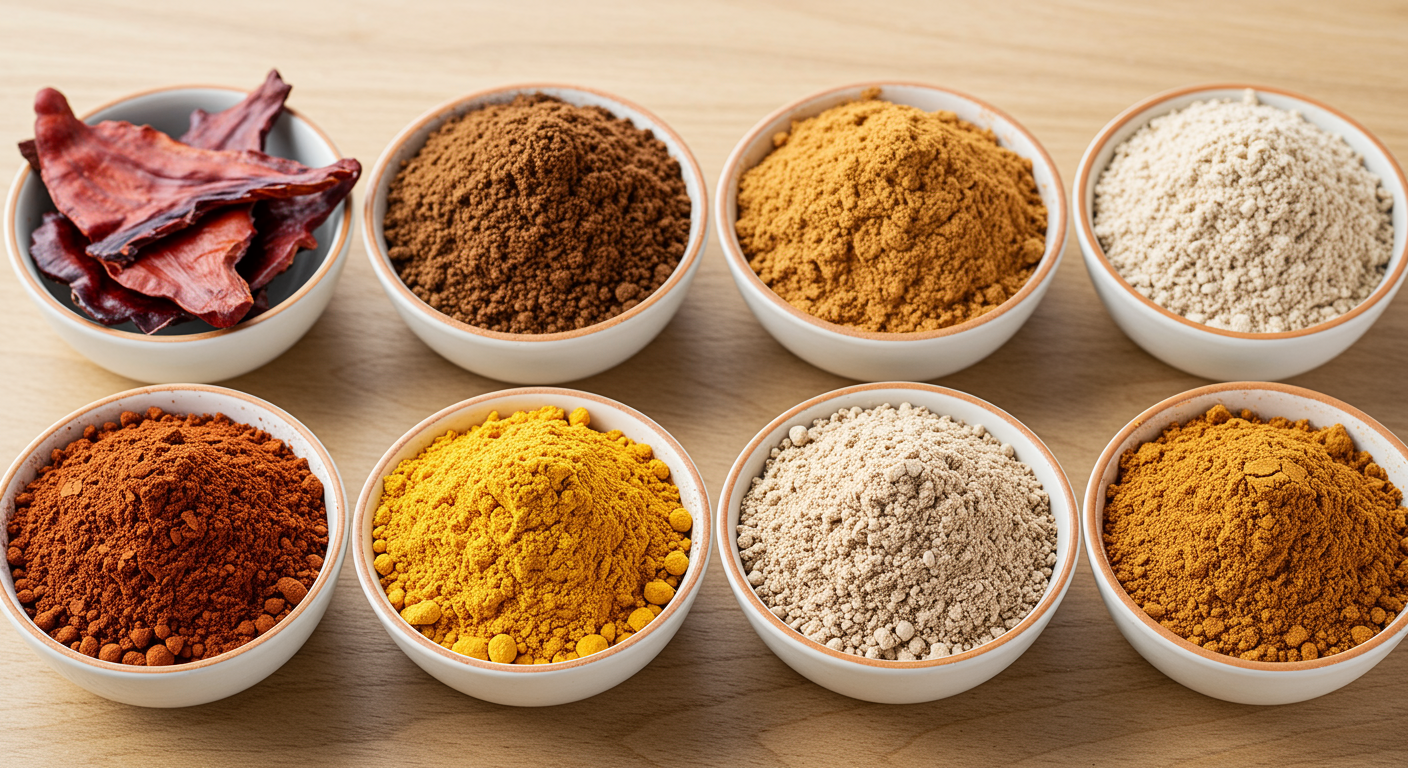
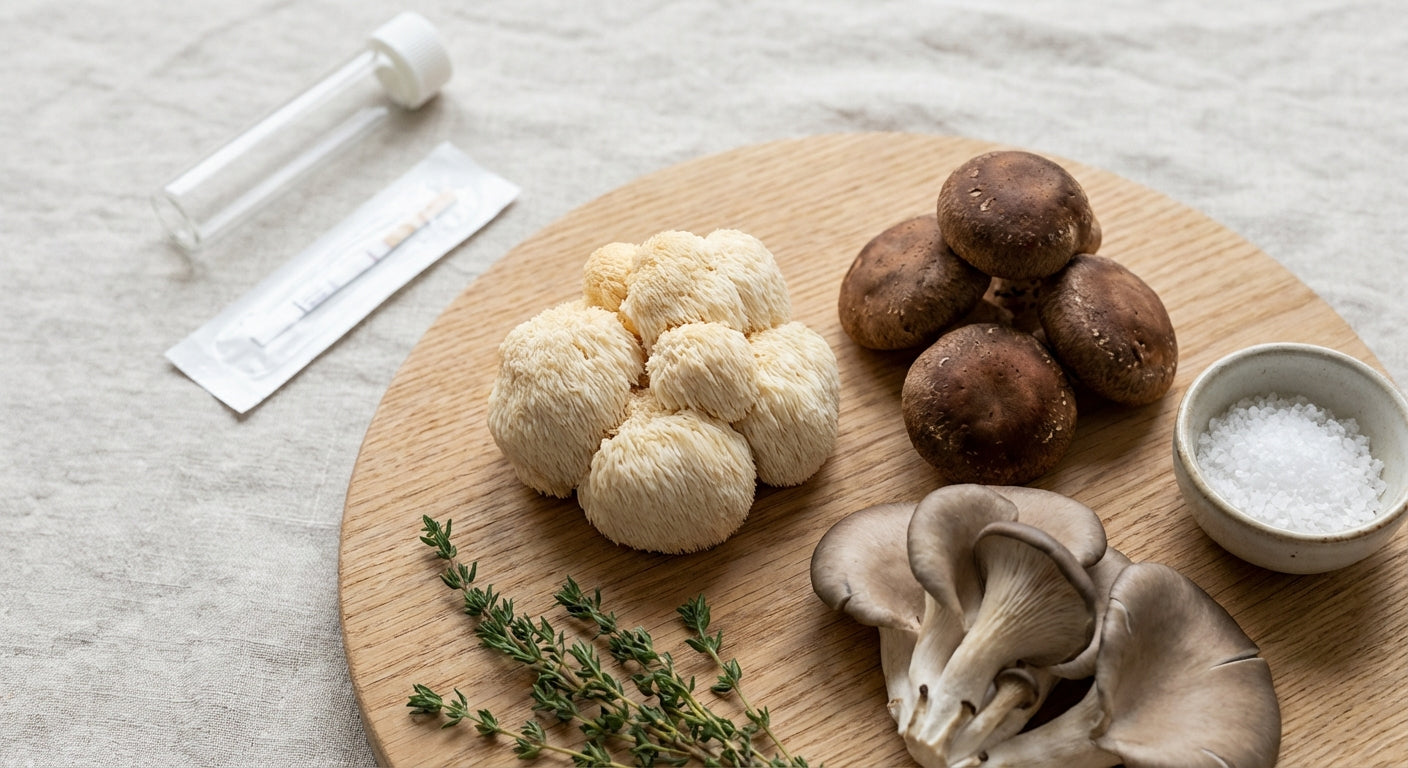
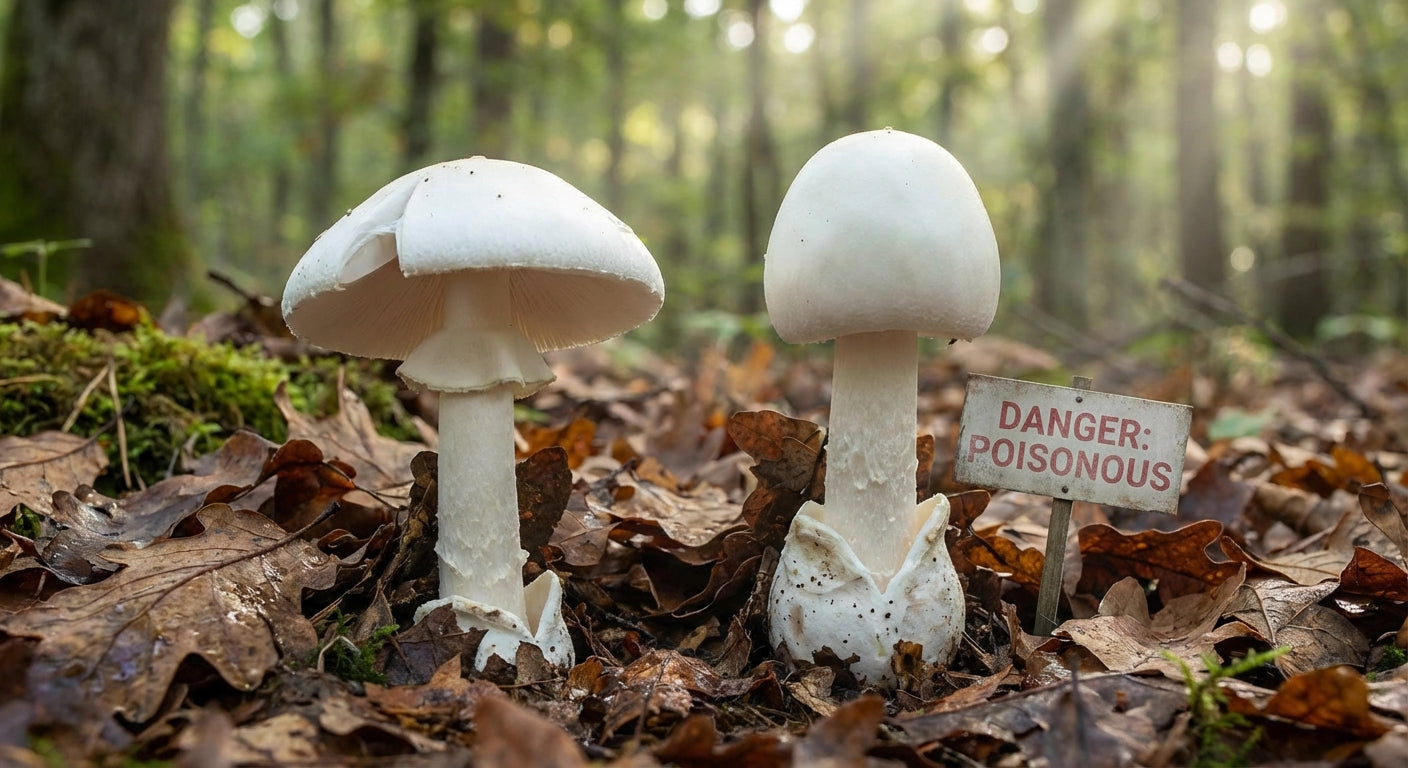


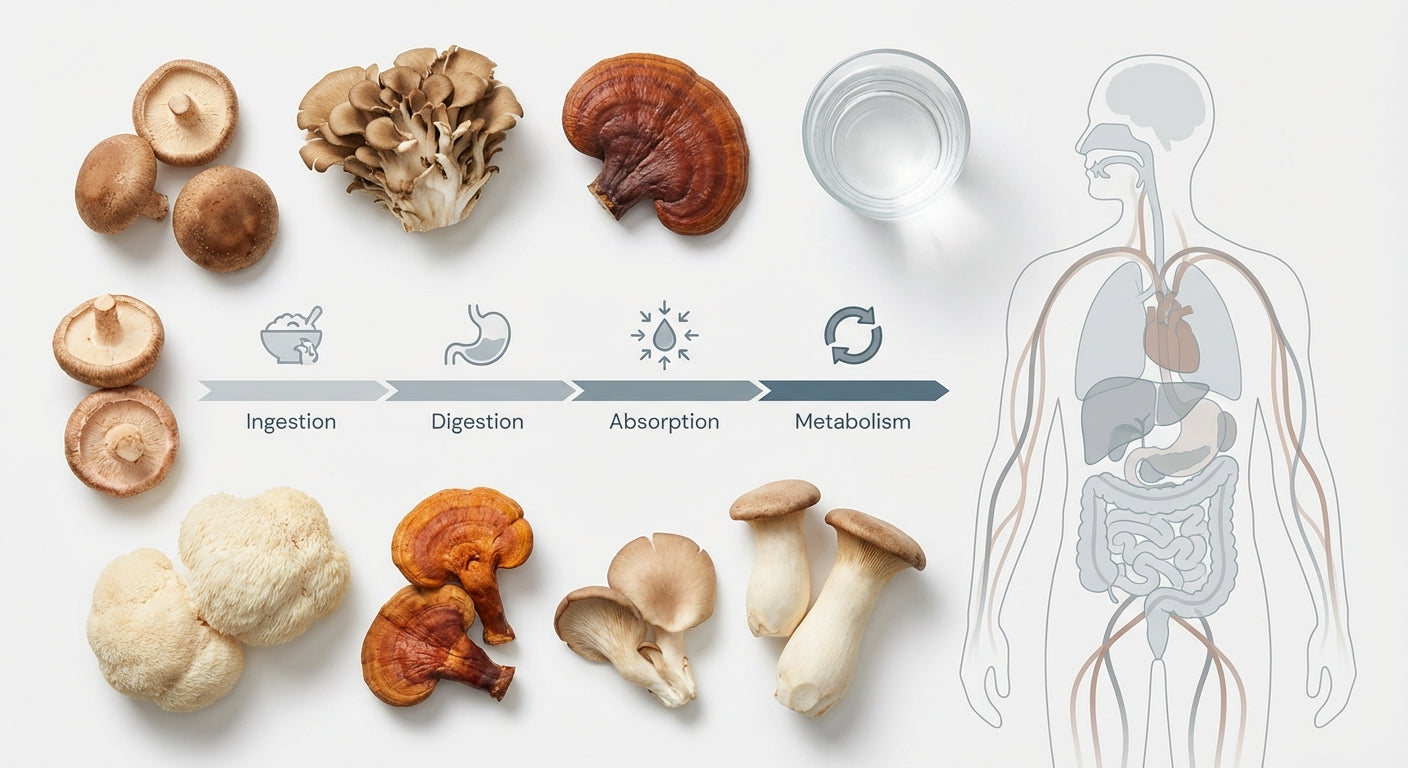

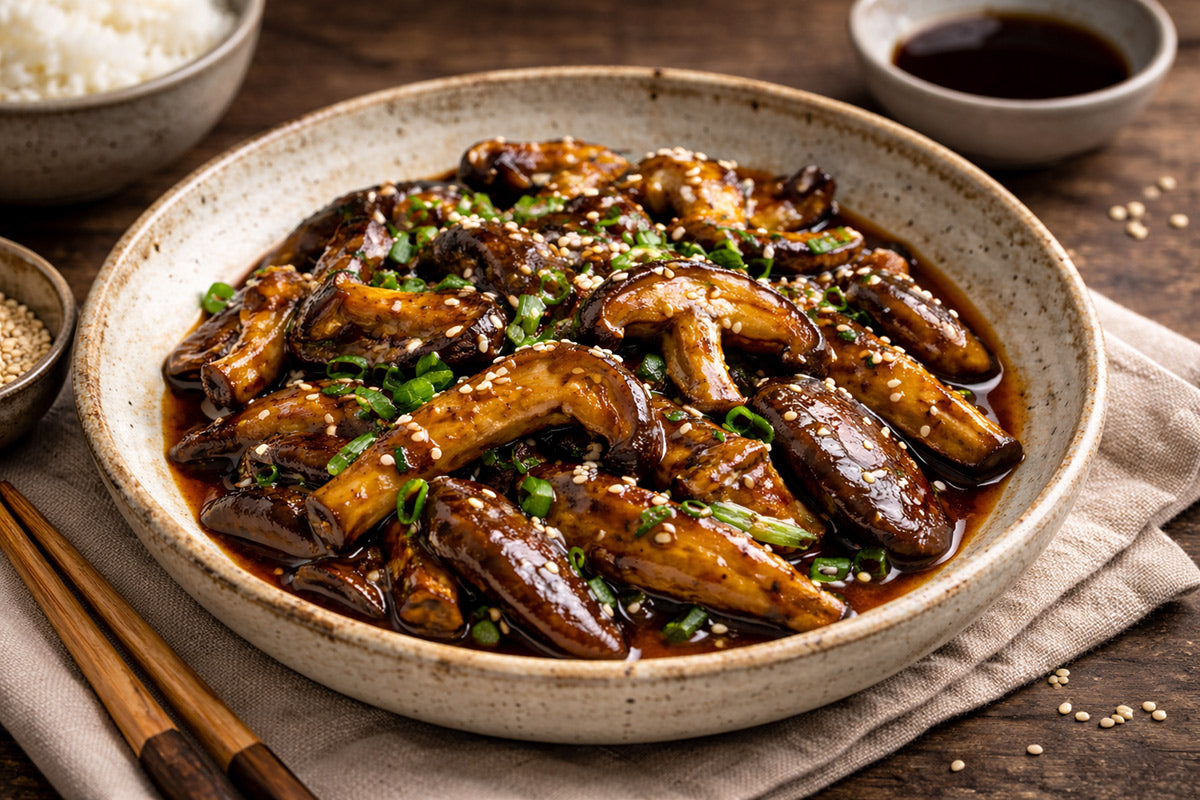
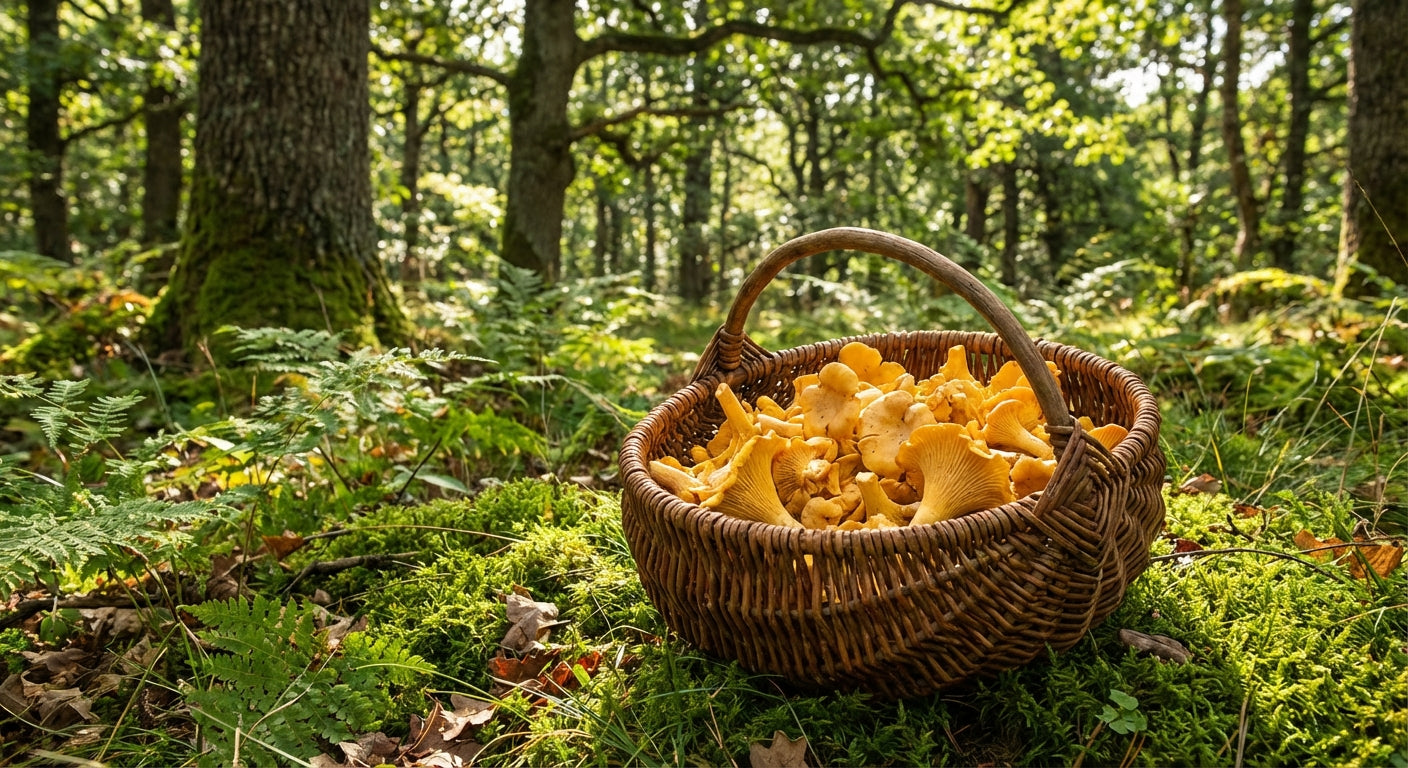




Share:
Kikurage Mushrooms: Complete Guide to Wood Ear Fungi 2025
Black Winter Truffle: The Complete Luxury Fungi Guide 2025